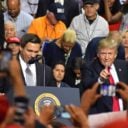During the 2012 Republicans National Convention, Ron Paul succeeded in adding an audit the Fed plank to the party platform, and Americans agree.
Americans overwhelmingly favor a public audit of the Federal Reserve and a sizable number feel the Fed chairman has too much power over the economy.
The latest Rasmussen survey found that 74% of American Adults favor a move to audit the Fed and making the results available to the public, while just 10 percent opposed an audit, and 16 percent were not sure.
The finds are the latest in a string of Rasmussen surveys surround public opinion of the Fed and support for the audit the Fed movement. Perhaps it is a skepticism over the Fed having so much power, but coupled with a general lack of confidence in the industry they oversee is certainly not helping.
During the September debate over a change of leadership, a survey found voters skeptical of the Federal Reserve’s independence and believed the nation’s central bank is overly influenced by the president and big bankers.
While 42 percent have “at least a somewhat” favorable opinion of the Federal Reserve, another 48 percent view it “unfavorably,” including 11 percent with a “Very Favorable” opinion and 19 percent with a “Very Unfavorable” opinion. Nevertheless, Americans generally lack confidence in the system, itself.
Over 5 years since the financial collapse, and 46 percent of American Adults say they are “at least somewhat” confident in the stability of the U.S. banking industry, but only 7 percent are “Very Confident.” with 50 percent lacking confidence in the banking industry today. Among the 50 percent lacking, 14 percent are “Not At All Confident.”
Clearly, the Republican Party has thus far missed out on a chance to capitalize on their populace credentials, no doubt because some in the GOP establishment disagree with the new generation of Republicans, who are far more in line ideologically with both Ron and Rand Paul on issues surrounding the Federal Reserve.
Americans, as a whole, are also more in line with the populace party message coming from libertarian-minded Republicans. Though the conservative ideology is fundamentally anti-cronyism, many party leaders have resisted the grassroots move to embrace what is clearly a winning strategy.
Voters hate crony capitalism in the United States, and 70 percent of Likely U.S. Voters think government and big business work together in ways that hurt consumers and investors, while just 13 percent disagree. Therefore, it is no surprise that most Americans want to end government subsidies for these ‘too big to fail’ institutions and half want to see those megabucks broken up.
A March survey found that 50 percent of U.S. Adults favored a plan to break up the 12 megabanks, which currently control about 69% of the banking industry. Twenty-three percent (23%) oppose breaking up the largest banks, while another 27% are undecided.






